
If you're wondering why emu farming is gaining traction, consider this: Unique health benefits and sustainable farming practices are just the beginning.
The allure of profitability and low maintenance coupled with the growing demand for emu products hint at a promising future.
Additionally, the potential for value-added products and supportive industry networks are factors worth exploring.
But, what else is driving this surge in popularity?
Key Takeaways
- Emu farming offers low maintenance requirements and high profitability.
- Sustainable practices attract consumers seeking ethically sourced, nutritious products.
- Growing demand for emu products in various industries boosts industry resilience.
- Emus' environmental friendliness and adaptability contribute to the industry's popularity.
Unique Health Benefits
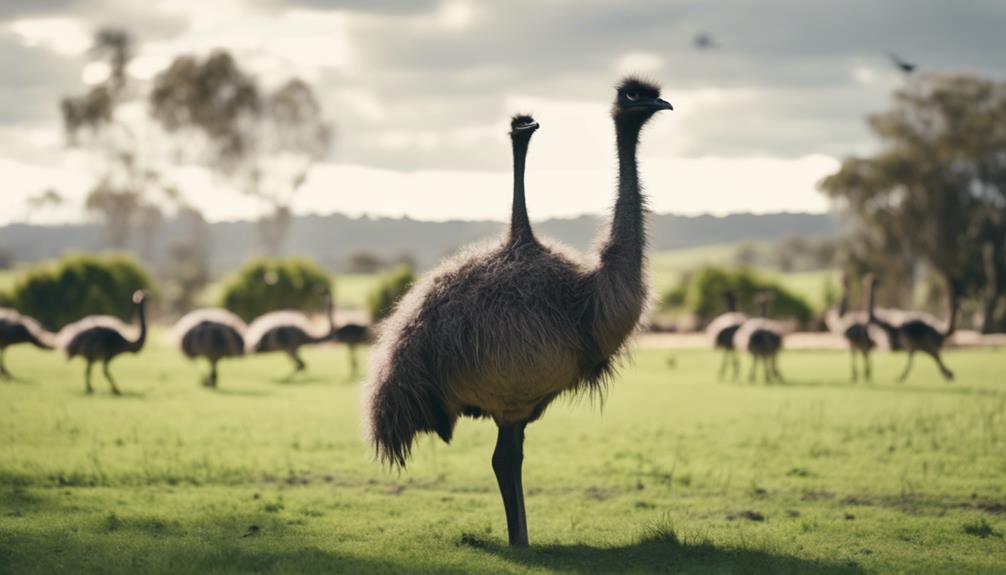
Emu farming offers a range of unique health benefits that are increasingly being recognized by health-conscious consumers worldwide. The nutritional benefits of emu meat are remarkable, as it's low in fat and cholesterol while being high in protein and iron. This makes it a healthy choice for those looking to maintain a balanced diet.
Emu oil, derived from the fat of these birds, is also highly valued for its anti-inflammatory properties and its use in skincare products.
Furthermore, the ethical sourcing involved in emu farming is an attractive feature for many consumers. Emus are typically raised in spacious environments, allowing them to roam freely and exhibit natural behaviors. This humane treatment of the birds not only aligns with ethical standards but also contributes to the quality of the final product.
Sustainable Farming Practices
With a growing emphasis on environmental consciousness in agriculture, sustainable farming practices play a pivotal role in the cultivation of emus and the production of their valuable resources. Emu farming is increasingly adopting practices that focus on environmental sustainability and ethical considerations. Here are some key aspects that highlight the importance of sustainable farming practices in the emu industry:
- Environmental Sustainability: Emu farming aims to minimize its environmental impact by implementing eco-friendly practices that reduce pollution and promote biodiversity.
- Ethical Practices: Emus are raised in environments that prioritize their well-being, ensuring they're treated humanely throughout their lives.
- Resource Efficiency: Emu farms strive to optimize resource usage, such as water and feed, to reduce waste and operate in a more sustainable manner.
- Land Conservation: Emu farming practices include land management strategies that help conserve natural habitats and protect ecosystems for future generations.
Profitability in the Industry
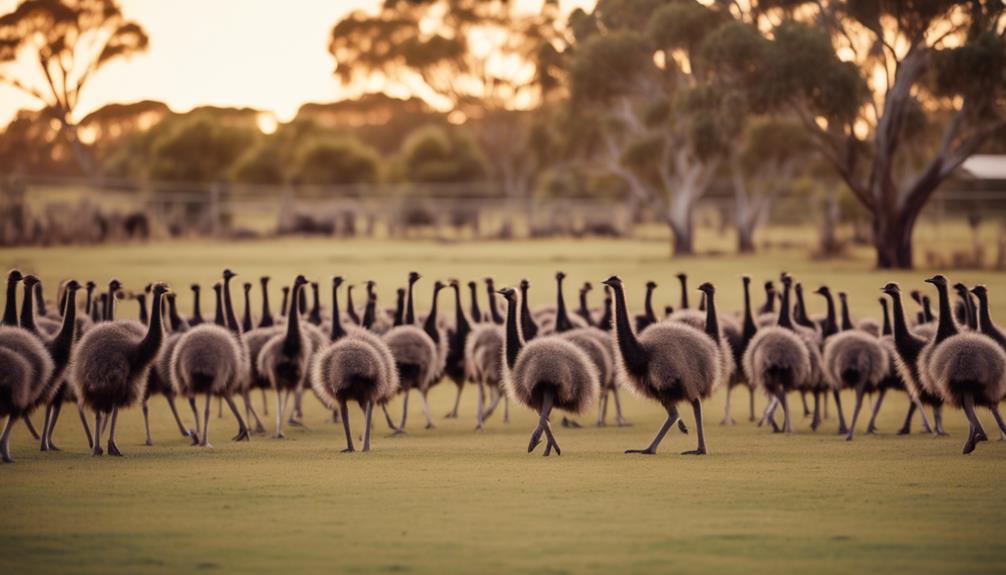
In assessing the emu farming industry, a critical factor to consider is the profitability that can be achieved through strategic management practices and market trends. Financial projections play a vital role in understanding the potential returns of an emu farm. Conducting thorough market research to analyze consumer demand and pricing trends can help in making accurate financial projections. Moreover, risk assessment is crucial in any business venture. Identifying and mitigating risks such as disease outbreaks or fluctuating market prices is essential for maintaining profitability.
| Factors to Consider | Analysis | Action Plan |
|---|---|---|
| Financial Projections | Understand potential returns | Adjust budget accordingly |
| Market Trends | Analyze consumer demand | Adapt product offerings |
| Risk Assessment | Identify potential risks | Develop contingency plans |
To gain a competitive advantage in the emu farming industry, staying informed about market trends and adapting business strategies accordingly can significantly impact profitability. By focusing on financial projections, market trends, and risk assessment, you can position your emu farm for success.
Low Maintenance Requirements
Considering the efficiency of care needed, emu farming stands out for its surprisingly low maintenance requirements compared to other livestock ventures. Emus are remarkably self-sufficient creatures, requiring minimal intervention to thrive on a farm. Here's why emu farming is both cost-effective and environmentally friendly:
- Minimal Feeding: Emus have modest appetites and can subsist on a diet of grass, supplemented with grains. This reduces feed costs significantly.
- Hardy and Resilient: Emus are hardy birds that can withstand harsh environmental conditions, reducing the need for expensive shelters or climate control systems.
- Low Veterinary Costs: Emus have robust immune systems, requiring minimal veterinary care compared to other livestock, leading to lower healthcare expenses.
- Sustainable Practices: Emus are environmentally friendly animals that produce less waste and have a lower carbon footprint compared to traditional livestock, making emu farming a sustainable agricultural practice.
Growing Demand for Emu Products
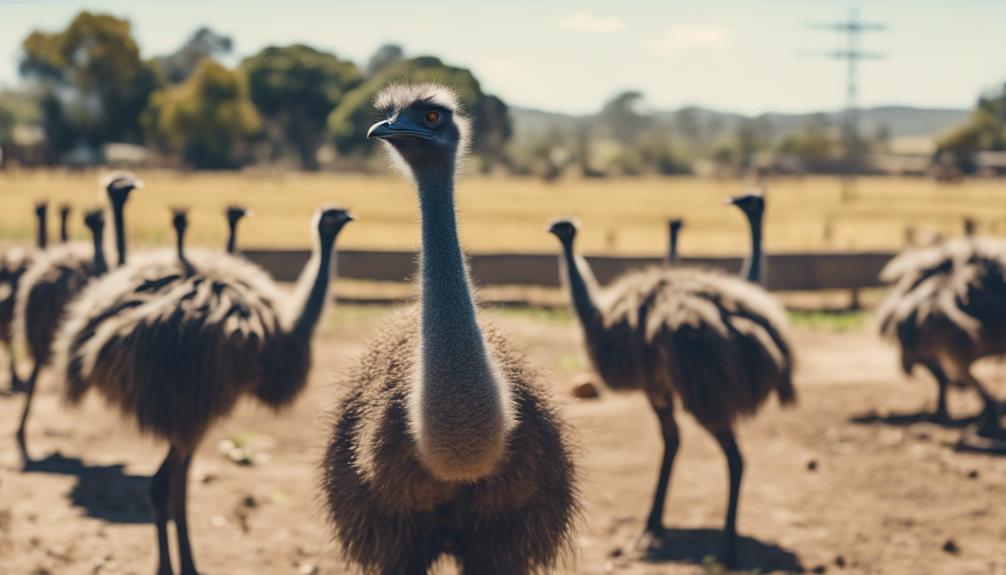
The increasing demand for emu products reflects a growing interest in their unique qualities and benefits within the market. Market trends show that consumers are increasingly drawn to natural and sustainable products, driving the demand for emu oil, meat, and feathers. Emu oil is prized for its anti-inflammatory properties and skincare benefits, making it a popular ingredient in cosmetics and pharmaceuticals. Additionally, the lean and flavorful emu meat has gained traction among health-conscious consumers looking for alternative protein sources.
Consumer preferences for ethically sourced and environmentally friendly products have also contributed to the economic impact and industry growth of emu farming. As more people become aware of the benefits of emu products, the market continues to expand. Emu farmers are responding to this demand by increasing their production to meet the growing market needs. This surge in interest not only benefits farmers but also highlights the potential for sustainable practices within the agricultural industry.
Diverse Revenue Streams
Diversification remains key to sustaining profitability in emu farming operations. To ensure economic stability and market diversification, emu farmers are exploring innovative ways to develop new products and revenue streams. Here are four strategies to enhance profitability:
- Value-Added Products: Emu farmers are creating a range of value-added products such as emu oil-based skincare products, feathers for crafts, and even emu meat snacks. By diversifying product offerings, farmers can tap into various market segments and maximize their revenue potential.
- Agritourism: Many emu farms are now offering agritourism experiences, allowing visitors to learn about emus, participate in feeding sessions, and purchase emu-related products directly from the farm. This not only generates additional income but also helps in building customer relationships and brand loyalty.
- Online Sales Platforms: Leveraging e-commerce platforms to sell emu products worldwide has become a popular choice for emu farmers. By reaching a broader audience online, farmers can increase sales and expand their market reach beyond local boundaries.
- Collaborations and Partnerships: Collaborating with local businesses, spas, or wellness centers to supply emu oil products can open up new avenues for revenue. These partnerships can help in mutual growth and offer a competitive edge in the market.
Emphasis on Animal Welfare
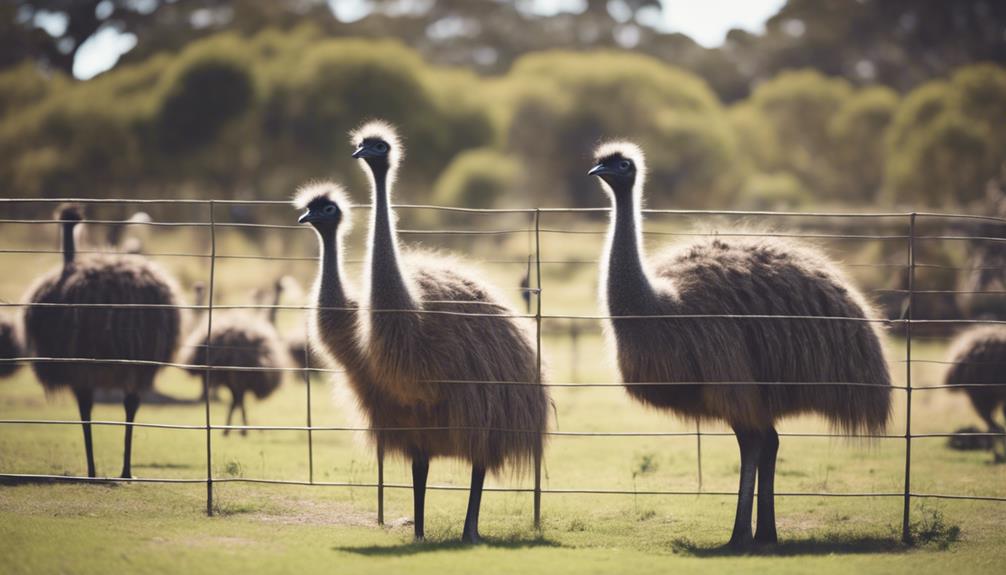
With an increasing focus on animal welfare in modern agricultural practices, emu farmers are implementing stringent measures to ensure the well-being and health of their emu populations. Animal ethics play a crucial role in shaping farming techniques within the emu industry. Emus are unique creatures with specific needs, and farmers are recognizing the importance of providing them with a comfortable and natural environment.
Incorporating ethically sound practices into emu farming not only benefits the animals but also enhances the quality of the products derived from them. By prioritizing animal welfare, farmers can improve the overall conditions in which emus are raised, leading to healthier and happier birds.
Advanced farming techniques are being employed to monitor the well-being of emus closely. From spacious living areas to balanced diets, every aspect of their care is being optimized. This attention to detail reflects a shift towards a more compassionate and sustainable approach to farming, resonating with consumers who value ethical practices in animal agriculture.
Resilience to Climate Change
Emu farming exhibits a notable adaptability to climate change, showcasing the industry's resilience in the face of environmental challenges. Emus have natural traits that equip them to thrive in various climates, making them well-suited for changing environmental conditions. Here are some reasons why emu farming is resilient to climate change:
- High heat tolerance: Emus can withstand high temperatures, reducing the impact of heatwaves on their well-being.
- Water efficiency: Emus are incredibly efficient in their water consumption, making them less vulnerable to droughts.
- Flexible diet: Emus have a diverse diet, allowing them to adapt to changes in vegetation caused by shifting climate patterns.
- Minimal environmental footprint: Emu farming generally has a low environmental impact, making it a sustainable choice even in the face of climate challenges.
Potential for Value-Added Products

Given the adaptability of emu farming to climate change, exploring the potential for value-added products broadens the horizons of this resilient industry. Emu products have gained popularity due to their health benefits and unique properties, creating opportunities for market expansion. By implementing innovative processing techniques, emu farmers can extract maximum value from their products, appealing to a diverse range of consumers.
| Value-Added Product | Description | Market Potential |
|---|---|---|
| Emu Oil | Rich in Omega-3 and Omega-6 fatty acids, emu oil is used in skincare and haircare products. | Growing demand for natural beauty products. |
| Emu Meat | Lean, red meat with a distinct flavor, emu meat is a healthy alternative to traditional meats. | Increasing interest in exotic and healthy protein sources. |
| Emu Feathers | Soft and durable, emu feathers are used in fashion, arts and crafts, and even as bedding material. | Sustainable and cruelty-free material for various industries. |
Exploring these value-added products not only enhances profitability but also promotes sustainability in the emu farming industry. By tapping into market expansion opportunities, farmers can diversify their revenue streams and meet the evolving demands of consumers.
Supportive Industry Networks
How do supportive industry networks contribute to the growth and sustainability of the emu farming sector?
Emu farmers benefit immensely from networking opportunities and collaborative efforts within the industry. Here's how these supportive networks play a crucial role:
- Networking Opportunities: By connecting with other emu farmers, suppliers, and industry experts, farmers can stay updated on the latest trends, technologies, and best practices in emu farming.
- Marketing Strategies: Collaborating with others in the industry allows emu farmers to develop effective marketing strategies, reach a broader audience, and promote their products more efficiently.
- Industry Collaborations: Working together with other farmers and businesses in the emu farming sector enables sharing of knowledge, resources, and experiences, leading to mutual growth and success.
- Resource Sharing: Whether it's sharing equipment, knowledge about breeding techniques, or accessing shared distribution channels, resource sharing within industry networks can significantly reduce costs and improve overall efficiency in emu farming operations.
Supportive industry networks not only foster a sense of community among emu farmers but also contribute to the sector's development and sustainability.
Increased Consumer Awareness
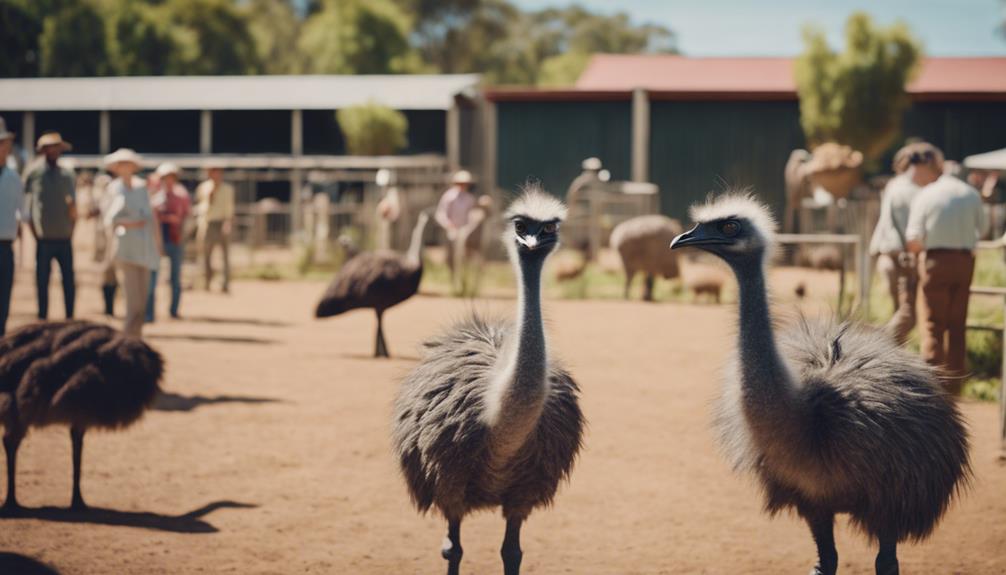
The surge in consumer awareness surrounding emu products has prompted significant shifts in purchasing behaviors and market demand. Consumers are becoming increasingly conscious of the ethical sourcing and environmental impact of the products they purchase, leading to a growing interest in emu farming practices. Emu products are gaining popularity not only for their perceived health benefits but also for the sustainable and ethical practices employed in their production.
| Ethical Sourcing | Environmental Impact |
|---|---|
| Emus allowed to roam freely on spacious farms | Low water consumption compared to other livestock |
| Humanely harvested emu oil for skincare products | Reduced greenhouse gas emissions |
| Emu meat from farms with transparent practices | Minimal land use and habitat disruption |
As consumers continue to prioritize sustainability and ethical considerations in their purchasing decisions, the emu farming industry is well-positioned to meet these evolving demands. By emphasizing the ethical treatment of emus and highlighting the positive environmental impact of emu farming, producers can further engage with this growing segment of conscientious consumers.
Regulatory Support and Guidelines
With the increasing interest in emu farming practices driven by consumer awareness, understanding the regulatory support and guidelines governing this industry becomes crucial for both producers and consumers. Government regulations play a significant role in ensuring the safety, quality, and ethical standards within the emu farming sector.
Here are some key points to consider:
- Licensing Requirements: Familiarize yourself with the specific licenses needed to operate an emu farm legally. Compliance with these requirements is essential to avoid penalties and ensure the legitimacy of your operation.
- Animal Welfare Standards: Stay informed about the regulations concerning the welfare of emus on your farm. Adhering to these standards not only upholds ethical practices but also enhances the quality of your products.
- Environmental Regulations: Understand the environmental impact of emu farming and comply with regulations aimed at minimizing any detrimental effects on the surroundings.
- Record-Keeping Obligations: Maintain detailed records of your farming practices to demonstrate compliance with regulatory guidelines. These records can also help track the progress and success of your emu farming venture.
Frequently Asked Questions
What Is the Average Lifespan of an Emu in Captivity?
In captivity, emus can live up to 20 years. Their lifespan is influenced by breeding habits, diet, and feather production. Emus are known for their reproductive abilities, laying eggs and raising chicks.
How Do Emu Farms Handle Waste Management and Environmental Sustainability?
When it comes to waste disposal on emu farms, sustainability is key. Emu farmers often implement conservation efforts to manage waste effectively. By adopting eco-friendly practices, these farms contribute to a cleaner environment and ensure long-term viability.
Are There Any Government Subsidies or Grants Available for Emu Farmers?
You can tap into government funding by exploring subsidies and grants for emu farming. Financial assistance is available to support your venture. Seek out these opportunities to bolster your farm's growth and sustainability.
How Often Do Emus Need to Be Vaccinated or Receive Medical Care?
To keep your emus healthy, stick to a vaccination schedule recommended by a vet. Regular health maintenance ensures their well-being. Emus typically need vaccinations and medical care once or twice a year.
Can Emu Feathers or Other Byproducts Be Used in Alternative Industries?
Ever wonder if Emu feathers could grace runways or if Emu oil could enhance beauty routines? Emu feathers can be a luxurious addition to the fashion industry, while Emu oil finds its place in the cosmetics industry.
Conclusion
As you reflect on the reasons behind the growing popularity of emu farming, you can't help but marvel at the perfect timing of it all.
The convergence of unique health benefits, sustainable practices, and increasing consumer awareness has created a harmonious ecosystem for this industry to flourish.
Like pieces of a puzzle falling into place, emu farming is poised to soar to new heights, offering a promising future for farmers and consumers alike.


